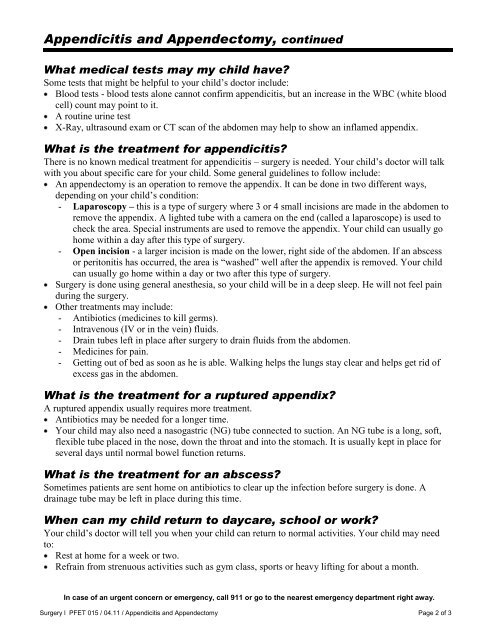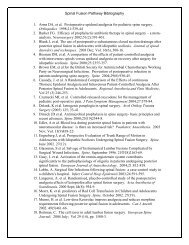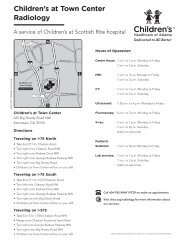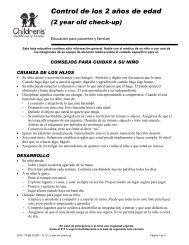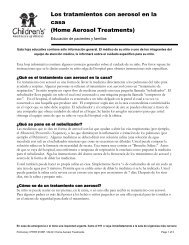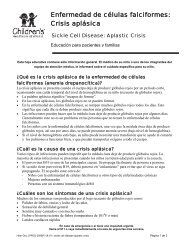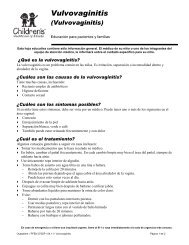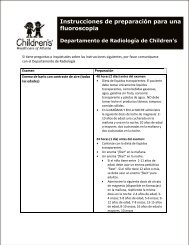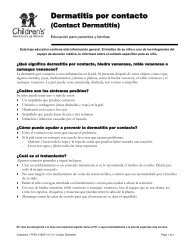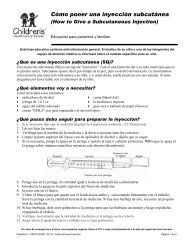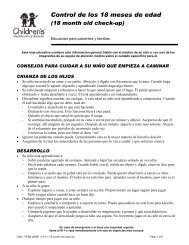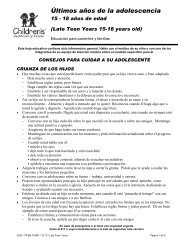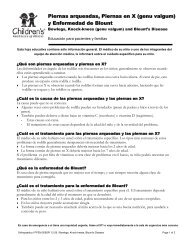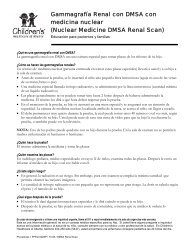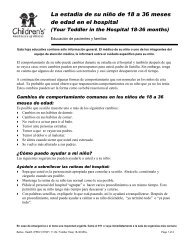Appendicitis and Appendectomy
Appendicitis and Appendectomy
Appendicitis and Appendectomy
You also want an ePaper? Increase the reach of your titles
YUMPU automatically turns print PDFs into web optimized ePapers that Google loves.
<strong>Appendicitis</strong> <strong>and</strong> <strong>Appendectomy</strong>, continued<br />
What medical tests may my child have?<br />
Some tests that might be helpful to your child’s doctor include:<br />
Blood tests - blood tests alone cannot confirm appendicitis, but an increase in the WBC (white blood<br />
cell) count may point to it.<br />
A routine urine test<br />
X-Ray, ultrasound exam or CT scan of the abdomen may help to show an inflamed appendix.<br />
What is the treatment for appendicitis?<br />
There is no known medical treatment for appendicitis – surgery is needed. Your child’s doctor will talk<br />
with you about specific care for your child. Some general guidelines to follow include:<br />
An appendectomy is an operation to remove the appendix. It can be done in two different ways,<br />
depending on your child’s condition:<br />
- Laparoscopy – this is a type of surgery where 3 or 4 small incisions are made in the abdomen to<br />
remove the appendix. A lighted tube with a camera on the end (called a laparoscope) is used to<br />
check the area. Special instruments are used to remove the appendix. Your child can usually go<br />
home within a day after this type of surgery.<br />
- Open incision - a larger incision is made on the lower, right side of the abdomen. If an abscess<br />
or peritonitis has occurred, the area is “washed” well after the appendix is removed. Your child<br />
can usually go home within a day or two after this type of surgery.<br />
Surgery is done using general anesthesia, so your child will be in a deep sleep. He will not feel pain<br />
during the surgery.<br />
Other treatments may include:<br />
- Antibiotics (medicines to kill germs).<br />
- Intravenous (IV or in the vein) fluids.<br />
- Drain tubes left in place after surgery to drain fluids from the abdomen.<br />
- Medicines for pain.<br />
- Getting out of bed as soon as he is able. Walking helps the lungs stay clear <strong>and</strong> helps get rid of<br />
excess gas in the abdomen.<br />
What is the treatment for a ruptured appendix?<br />
A ruptured appendix usually requires more treatment.<br />
Antibiotics may be needed for a longer time.<br />
Your child may also need a nasogastric (NG) tube connected to suction. An NG tube is a long, soft,<br />
flexible tube placed in the nose, down the throat <strong>and</strong> into the stomach. It is usually kept in place for<br />
several days until normal bowel function returns.<br />
What is the treatment for an abscess?<br />
Sometimes patients are sent home on antibiotics to clear up the infection before surgery is done. A<br />
drainage tube may be left in place during this time.<br />
When can my child return to daycare, school or work?<br />
Your child’s doctor will tell you when your child can return to normal activities. Your child may need<br />
to:<br />
Rest at home for a week or two.<br />
Refrain from strenuous activities such as gym class, sports or heavy lifting for about a month.<br />
In case of an urgent concern or emergency, call 911 or go to the nearest emergency department right away.<br />
Surgery l PFET 015 / 04.11 / <strong>Appendicitis</strong> <strong>and</strong> <strong>Appendectomy</strong> Page 2 of 3


